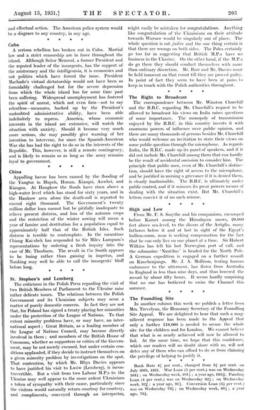The Right to Broadcast The correspondence between Mr. Winston Churchill
and the B.B.C. regarding Mr. Churchill's request to be allowed to broadcast his views on India raises questions of some importance. The monopoly of transmission enjoyed by the B.B.C. in this country invests it with enormous powers of influence over public opinion, and there are many thousands of persons besides Mr. Churchill who would welcome an invitation to state their views on some public question through the microphone. As regards India, the B.B.C. made up its panel of speakers, and if it did not include Mr. Churchill among them that can hardly be the result of accidental omission to consider him. The principle that public men, even of Mr. Churchill's distinc- tion, should have the right of access to the microphone, and be justified in nursing a grievance if it is denied them, is clearly inadmissible. The B.B.C. is ultimately under public control, and if it misuses its great powers means of dealing with the situation exist. But Mr. Churchill's letters convict it of no such misuse.






























 Previous page
Previous page